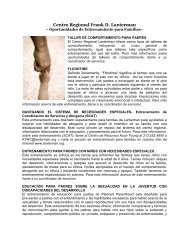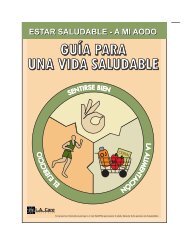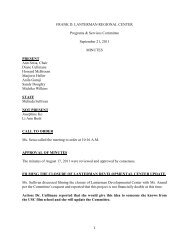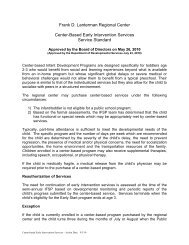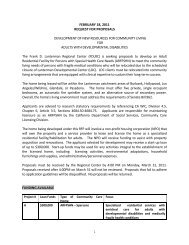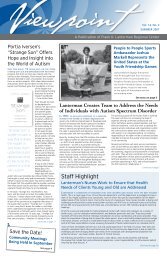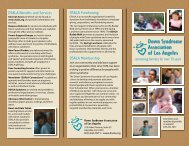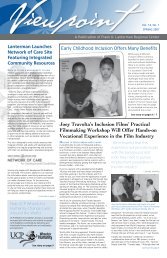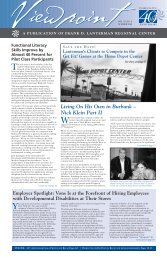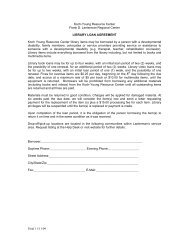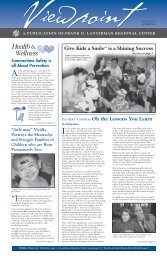Guide to Lanterman for Early Start Families - Frank D. Lanterman ...
Guide to Lanterman for Early Start Families - Frank D. Lanterman ...
Guide to Lanterman for Early Start Families - Frank D. Lanterman ...
You also want an ePaper? Increase the reach of your titles
YUMPU automatically turns print PDFs into web optimized ePapers that Google loves.
Funding Requirements <strong>for</strong> <strong>Early</strong> <strong>Start</strong> Services<br />
In carrying out their responsibilities, regional centers are also required <strong>to</strong> be<br />
responsible stewards of the public funds. More specifically, regional centers<br />
are required <strong>to</strong>:<br />
v Live within our budget each year.<br />
v Ensure that the Regional Center does not pay <strong>for</strong> services and supports<br />
that should be provided by other agencies, such as local school districts,<br />
Medi-Cal, Cali<strong>for</strong>nia Children’s Services, Social Security and private<br />
health insurance.<br />
v Help families gain access <strong>to</strong> typical community resources and develop<br />
natural supports.<br />
v Secure services only from qualified service providers.<br />
v Locate or develop innovative and cost-effective ways <strong>to</strong> achieve desired<br />
outcomes identified in the IFSP.<br />
v Continue purchasing services only where there is both reasonable<br />
progress in achieving the IFSP outcomes and agreement between the<br />
family and the Regional Center that the services should be continued.<br />
v Develop and purchase specialized services only if natural environments,<br />
generic services and supports, or typical community resources do not<br />
meet the child’s needs as specified in his or her IFSP.<br />
v If two services or supports are available and would be equally effective<br />
in meeting the needs of a child, the Regional Center is required <strong>to</strong><br />
purchase the less costly alternative.<br />
Defining Generic Services<br />
There are many public agencies that are required by<br />
law <strong>to</strong> provide services <strong>to</strong> children with, or at risk <strong>for</strong>,<br />
developmental delays or disabilities. These include county<br />
mental health agencies, Medi-Cal and Cali<strong>for</strong>nia Children’s<br />
Services. We refer <strong>to</strong> these agencies as generic agencies and<br />
<strong>to</strong> the services and supports they provide as generic services.<br />
Natural Environments:<br />
What are they?<br />
CEISA requires regional centers <strong>to</strong><br />
ensure that, <strong>to</strong> the maximum extent<br />
possible, early intervention services are<br />
provided in the natural environment and<br />
include the use of natural supports and<br />
generic community resources. Natural<br />
environments are settings that are typical<br />
<strong>for</strong> other children of the same age who<br />
do not have developmental delays or<br />
disabilities. These would include the<br />
family home, a babysitter’s home, or<br />
a community setting such as a local<br />
preschool, a neighborhood play group or<br />
a public park.<br />
Natural Supports:<br />
What are they?<br />
Excerpt from the Department of<br />
Developmental Services’ publication,<br />
“How <strong>to</strong> Develop Natural Supports”<br />
As defined in the <strong>Lanterman</strong><br />
Developmental Disabilities Services Act,<br />
Section 4512 of the Welfare and Institution<br />
Code, Part (e): “Natural Supports” means<br />
personal associations and relationships<br />
typically developed in the community that<br />
enhance the quality and security of life<br />
<strong>for</strong> people, including, but not limited <strong>to</strong>,<br />
family relationships; friendships reflecting<br />
the diversity of the neighborhood and the<br />
community…<br />
What does “Natural Supports” really<br />
mean? Think about all the people in your<br />
life – friends, family, co-workers – who<br />
are important <strong>to</strong> you and on whom you<br />
depend. Relationships with these people<br />
are your natural supports.<br />
The entire publication can be accessed on the<br />
Department of Developmental Services Web site<br />
at www.dds.ca.gov.



